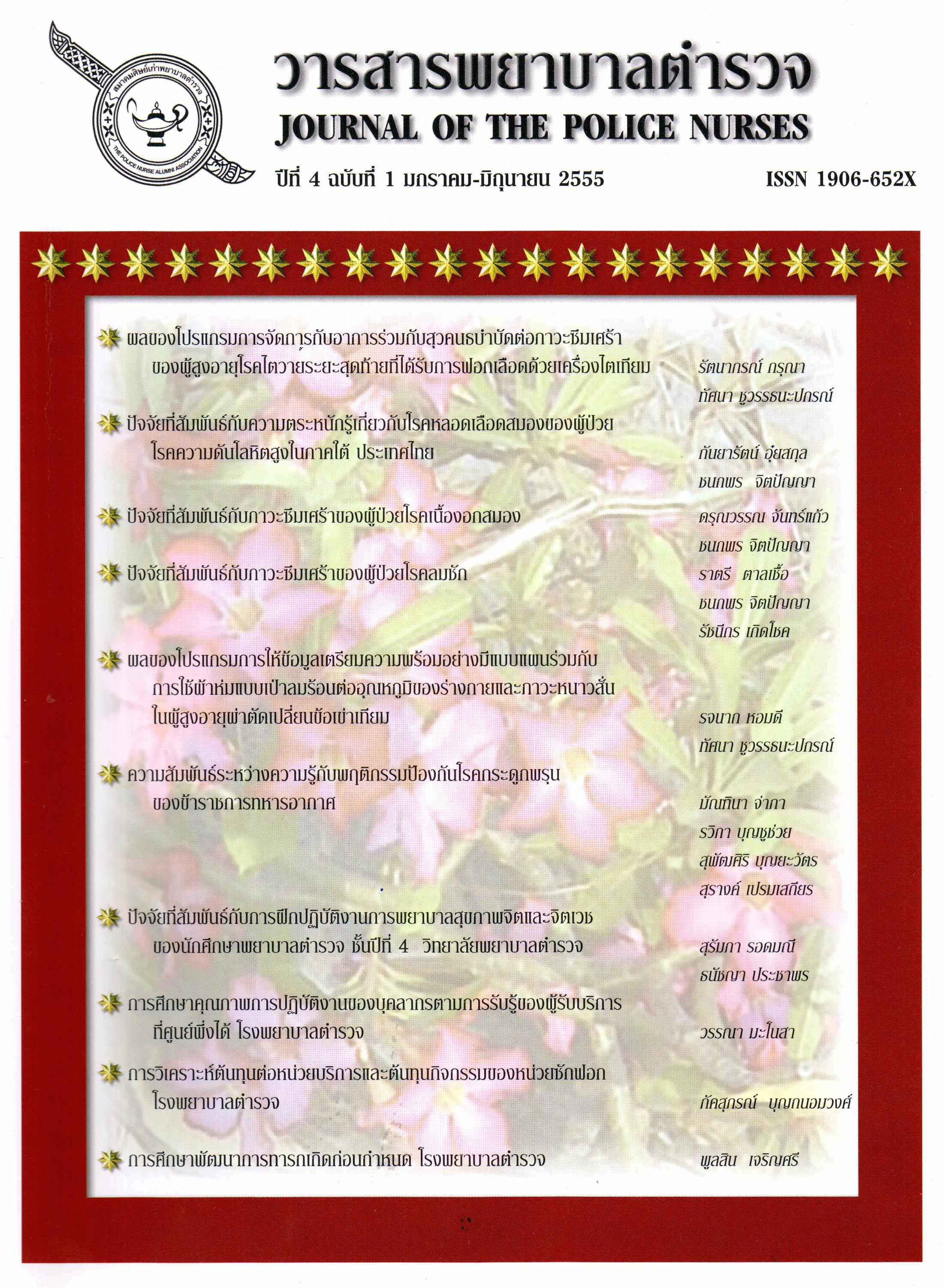ผลของโปรแกรมการจัดการกับอาการร่วมกับสุวคนธบำบัด ต่อภาวะซึมเศร้าของผู้สูงอายุ โรคไตวายระยะสุดท้ายที่ได้รับการฟอกเลือดด้วยเครื่องไตเทียม
Keywords:
ภาวะซึมเศร้า, สุวคนธบำบัด, ผู้สูงอายุโรคไตวายระยะสุดท้าย, Depression, Aromatherapy, Older persons with end stage renal diseaseAbstract
บทคัดย่อ
การวิจัยครั้งนี้เป็นการวิจัยเชิงทดลอง ชนิดสองกลุ่มวัดก่อน และหลังการทดลอง โดยมีวัตถุประสงค์เพื่อศึกษา ผลของโปรแกรมการจัดการกับอาการร่วมกับสุวคนธบำบัดต่อภาวะซึมเศร้าของผู้สูงอายุโรคไตวายระยะสุดท้ายที่ได้รับการฟอกเลือดด้วยเครื่องไตเทียม ตัวอย่างคือ ผู้สูงอายุที่ได้รับการวินิจฉัยเป็นโรคไตวายระยะสุดท้าย และได้รับการบำบัดทดแทนไตด้วยวิธีฟอกเลือดด้วยเครื่องไตเทียม ณ โรงพยาบาลเชียงรายประชานุเคราะห์ จำนวน 40 คน แบ่งเป็นกลุ่มทดลองและกลุ่มควบคุม กลุ่มละ 20 คน กลุ่มควบคุมได้รับการพยาบาลตามปกติ ส่วนกลุ่มทดลองได้รับโปรแกรมการจัดการกับอาการร่วมกับสุวคนธบำบัด ที่ผู้วิจัยสร้างขึ้นตามกรอบแนวคิดการจัดการกับอาการและการดูแลแบบผสมผสาน โดยดำเนินการวิจัยเป็นรายบุคคล เครื่องมือที่ใช้ในการเก็บรวบรวมข้อมูลประกอบด้วย แบบสัมภาษณ์ข้อมูลทั่วไป แบบวัดความซึมเศร้าที่มีค่าความเชื่อมั่นเท่ากับ .85 วิเคราะห์ข้อมูลด้วยการแจกแจงความถี่ ค่าเฉลี่ยร้อยละ ส่วนเบี่ยงเบนมาตรฐานและสถิติค่าที
ผลการวิจัยพบว่า
1. ค่าเฉลี่ยคะแนนภาวะซึมเศร้ากลุ่มทดลองภายหลังได้รับโปรแกรมการจัดการกับอาการร่วมกับสุวคนธบำบัดน้อยกว่าก่อนได้รับโปรแกรมฯ อย่างมีนัยสำคัญทางสถิติที่ระดับ .05 (p < .05)
2. ค่าเฉลี่ยคะแนนภาวะซึมเศร้าภายหลังเข้าร่วมการทดลองของกลุ่มทดลองน้อยกว่ากลุ่มควบคุมอย่างมีนัยสำคัญทางสถิติที่ระดับ .05 (p < .05)
The Effect of Symptom Management and Aromatherapy Program on Depression among Older Persons with End Stage Renal Disease Receiving Hemodialysis
Abstract
This two group pretest and posttest quasi- experimental research aimed to study the effect of symptom management and aromatherapy program on depression among older persons with end stage renal disease received hemodialysis. The samples were 40 older persons diagnosed end stage renal disease and received hemodialysis at Chiangrai Prachanukroh Hospital. They were divided into experimental group and control group equally. The control group received conventional nursing care whereas the experimental group received a symptom management and aromatherapy program which were developed by the researcher based on the Symptom Management Concept with Complementary Concept. The program was conducted individually on the experiment group. The data collecting in this study included 1) The Demographic Data Interview and 2) The Depression Questionnaire with the reliability of .85. Frequency, percentage, mean and standard deviation were used for data analysis, and t-test.
The results revealed that
1. The mean score of depression on experimental group after receiving symptom management with aromatherapy program was significantly lower than that of before receiving symptom management and aromatherapy program (p < .05)
2. The mean score of depression on experimental group was significantly lower than that of the control group (p < .05)
Downloads
Downloads
How to Cite
Issue
Section
License
ผลงานที่ได้ตีพิมพ์แล้วจะเป็นลิขสิทธิ์ของวารสารพยาบาลตำรวจ















